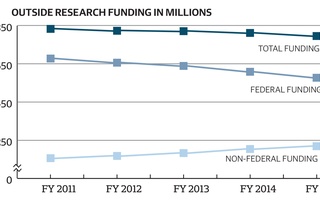In an era when so-called “fake news” is rampant and the Oxford Dictionaries name “post-truth” as their word of the year, Harvard’s commitment to objectivity in research must remain paramount. This objectivity must extend not only to conducting research in a fair manner, but also to resisting pressure exerted by corporations donating to Harvard for specific research aims, an area in which the University has historically been imperfect.
The simplest way to curtail unwholesome outside influences on Harvard’s research is for the University not to accept private funding and to instead rely on the federal government for its financial needs. Nevertheless, given that nearly one-fourth of grants the University received in fiscal year 2016 came from private sources and the increased uncertainty of federal funding under President Donald Trump, refusing to accept funds from all private organizations for research would inevitably do more harm than good. Not every private organization that gives money to Harvard attempts to unfairly influence the ways in which the donation is used by the University’s researchers.
That said, Harvard can attempt to resolve ethical dilemmas it may face by refusing funding from donors that may have obvious conflicts of interest. While this standard of integrity might risk the reduction of some research budgets, depending on the size of the donations in question, it is vastly preferable to producing research of compromised legitimacy and with undermined academic freedom. In more complex situations, if Harvard decides that it is worthwhile to accept funding from a donor interested in a given field, the administration must be forthcoming about the specific ways in which they decide to use the grants.
With this in mind, the primary challenge lies in creating guidelines and regulations that allow Harvard to only accept funding from outside sources if there is no obvious conflict of interest. In writing and implementing these, balance is critical: if these rules are too lax, Harvard’s research will stray from objectivity, but if they are too strict, would-be benefactors will inevitably choose to donate elsewhere.
According to University Provost Alan M. Garber ’76, restrictions are currently in place and have been well-received by corporate donors. However, as private donations to the University’s research continue to rise, it is important that these restrictions are frequently reviewed and updated to account for the changing ways in which the University relies on its varied funding sources, and that these rules are made transparent to parties interested in assessing Harvard’s ethical standards. Only through the advancement of these guidelines can Harvard rise above the quandaries regarding the role of objectivity that appear so often in the world today; in a time when such Orwellian turns of phrase as "alternative truth" have found their way into the mainstream, Harvard must redouble its commitment to the standards of academic inquiry.Read more in Opinion
Virtue has a Veil, Vice a MaskRecommended Articles
-
New Challenges Ahead for HMS Dean MartinWhen Daniel C. Tosteson '44 steps down from his post as dean of the Medical School (HMS) this June, he
-
Rudenstine goes to bat in Washington to save fundingPresident Neil L. Rudenstine traveled in person last week to Capitol Hill and the White House in an attempt to
-
Saving Research DollarsPresident Neil L. Rudenstine has traditionally played little role in the life of a Harvard undergraduate. His tenure has emphasized
-
Patrick Increases Stem Cell FundsGovernor Deval L. Patrick ’78 announced a $1.25 billion funding initiative earlier this week for life science research in Massachusetts
-
 Harvard’s Outside Research Funding Continues To Fall
Harvard’s Outside Research Funding Continues To Fall













